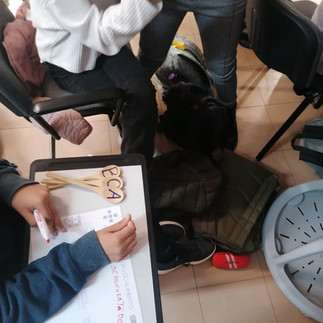+ Healthy Program
- Ana Rita Silva

- Mar 21, 2022
- 3 min read
It was under the theme "The Food Journey" that we developed a face-to-face action with 5th and 6th grade students, in a school in Lisbon, reaching a total of 300 students and their teachers.

Students and teachers experienced learning moments on topics related to healthy eating and sustainability, on a journey that led them to learn about the path that food takes from the meadow to our plate, ending with the 10 principles of the Mediterranean Diet. This particular action was also designed to prepare students to successfully complete the Eco-Schools - Environmental Education for Sustainability in Schools challenges.
Starting with the concepts that characterise food production, addressing topics such as hydroponics, aquaculture and aquaponics, as well as the relevance of the place of production for the best food choices, the session went through structuring themes of the food chain.
Sara Rodrigues, from the agronomy area, started the food journey with a strong focus on resources and their availability. With the aim of expanding the students' notion of the existing production systems, she gave a brief presentation of contrasting alternatives, explaining to the students that conventional production is currently being supplemented by other production models, namely without soil, as the need to produce food in a more resource-conscious way and to feed a growing world population leads to the development of other production practices.
The seasonality of food was one of the themes that most interested the students, due to the particularity with which it was approached, through an interactive game. "This type of exercise and game is very popular with young people. They are always a good way to disseminate content due to the pedagogical and practical way in which they are transmitted," explains Catarina Vasconcelos, an F4S nutritionist with extensive experience in actions aimed at young people.
"Students of these ages are very interested in these topics and are the first to want to adopt changes in their consumption and to take the good practices learned to their families. They participate with enthusiasm, and are always so receptive to the new concepts acquired", says Joana Grácio, coordinator of the action developed.
At the end of the session, the students felt able to interpret food labels, with particular attention to identifying added sugars, as well as the place where the food was produced. They were also able to successfully identify the 10 principles of the Mediterranean Diet, relating them to aspects of daily life.
"We are developing healthy food services in order to bring knowledge and practices on health and sustainability to companies, municipalities and the school community, through face-to-face actions, and experiences that are transformative. This action was a success, and we are confident that we will soon reach more people, as health and sustainability are topics that interest everyone: Companies, in the sense of valuing their employees and bringing them creative ways to live healthier; municipalities, because they want to invest in community health solutions that involve the population; the school community, because it is with the young and their teachers that it is possible to see an effervescent will to change paradigms and behaviours, they are our future", said Cecilia Franco, responsible for CoLAB's healthy eating services.
"In our team we gather knowledge and experience in nutrition and agronomy that allow us to develop transversal actions and on such current and important issues, with the goal of achieving carbon neutrality in food production and bringing healthy food to everyone," said the nutritionist who has been part of the Food4Sustainability team since 2021.
In May, the team will return again to the school for a second in-person action, which will also include a show-cooking session led by Rossano Fillippini, agricultural engineer and chef at F4S.
If you would like to know a little more about these services, and would like to be part of this + Healthy programme, you can contact Cecília Franco via email cecilia.franco@food4sustainability.org






































Comments